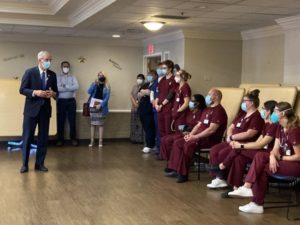Columbus, OH, in February Is Next Step

VA Secretary Denis McDonough met with veterans and staff at the Spokane Veterans Home after a visit to Mann-Grandstaff VAMC last spring. Photo from the Washington State Department of Veterans Affairs via Twitter
SPOKANE, WA — Despite lingering problems with the deployment of its new electronic medical record system at the Mann-Grandstaff VAMC in Spokane, VA, officials said the department is still on track to deploy the system in Columbus, OH, early in 2022.
Legislators expressed concern, especially considering the results of a recent survey of Mann-Grandstaff employees that reveals the EHR’s impact on staff morale.
The survey, conducted by VA, found that 83% of respondents reported a decrease in morale since the CERNER-developed EHR was launched at the medical center in October 2020, and 75% reported that their job satisfaction has worsened. More than 62% responded that EHR problems have made them question whether they want to keep working at the facility. Since the EHR’s deployment, Spokane staff have submitted 829 patient safety tickets, 576 of which were related specifically to the EHR.
VA officials defended their progress at the Spokane facility at a House Veterans Affairs Technology Subcommittee hearing last month, testifying that problems with the system are being investigated and corrected.
“We do have a plan,” explained Deputy VA Secretary Donald Remy. “We learned that, going in, in a system like this it’s highly likely that a patient safety issue, or any issue, might present. Anytime that occurs, it goes into a process so we can understand the root cause, so we can develop strategies to resolve the problem immediately and so we can put in place a mitigation plan, so it doesn’t happen again. And we can learn the lessons from that circumstance so that it doesn’t occur at any future locations.”
Some of those issues are more complex than others and are defying quick solutions, however. Legislators cited problems with creating pharmacy orders as one example.
While the legacy EHR system prevented providers from placing an incorrect pharmacy order, that is not the case with the new system, forcing staff at Spokane to find manual workarounds.
Remy told committee members that VA is still working with CERNER to solve the pharmacy order issue
“We need to make sure this new system doesn’t put us in a position that appears to be worse than the prior system and that we don’t have so many inefficiencies that we can’t deliver our pharmacy needs to our veterans in a timely and effective fashion,” he said. “Some of the issues that have arisen were difficult issues where it was hard to break down the point of failure along the way.”
Remy also explained that the early 2022 date for the Columbus VAMC was for deployment of the system, which is different from a “go live.”
“When we deploy the system, we’re still in the early processes of making sure we have training and testing,” he explained. “[Only after that’s completed] do we flip a switch and go live at a location. … We’ll have sandbox exercises to make sure the facility is ready to receive and we’ve given them the tools to be able to be successful.”
The VA has announced its plans to deploy the Cerner EHR at the VA facility in Columbus in February of 2022, and legislators from Washington told Remy that there was a feeling among Spokane staff that moving on to Columbus would result in a lack of focus on fixing the existing problems at Mann-Grandstaff.
Addressing Problems
“There’s a sense that you’re moving on to Columbus and you’re done at Mann-Grandstaff,” declared Rep. Cathy McMorris Rodgers (R-WA). “On behalf of the veterans of Eastern Washington, I need to know that you are listening to their concerns and you are committed to addressing these underlying technical problems.”
Remy assured the congresswoman that VA was committed.
“Mann-Grandstaff is a priority,” he declared. “All of the locations we’re deploying to will continue to receive treatment even after go-live.”
Asked whether he believes that the CERNER system is safe and will eventually be fully functional, Remy answered in the affirmative.
“The CERNER EHR system works. It’s been used in over 27,000 provider facilities. It’s currently being implemented at DoD sites all across the nation,” he declared. “So the natural question is, if it’s working so well at other healthcare systems, why won’t it work at VA? I think it will work at VA. But I’ve got to say, we’re making a big change from a site-by-site system that allows differences in how staff do their jobs to one that will provide standardized workflows across the enterprise. This change will benefit veterans providers over the long run, but it’s a big transition.”
Remy did admit, however, that VA’s handling of the rollout to date “has failed to live up to this program’s promise, both for our veterans and our providers.”
“Throughout the history of this project, silos have been unintentionally created within VA. I’ve seen some of these barriers myself,” he added.
VA is in the process of creating a new governance structure for the program, which includes the creation of a new executive position placed between the EHR program and Remy, which would be responsible for the day-to-day evolution of the program.
“That individual needs to ensure that we continue to have interoperability between all of our components at VA,” Remy explained. The person needs, as the day-to-day executive in charge of the deployment, have direct contact with our facilities, with our sites, that we’re going to deploy at. And they need to make sure they’re reporting through the governance structure any potential changes we need to make.”
Remy said that VA is still actively recruiting applicants and hopes that they will find the right match within the department.

